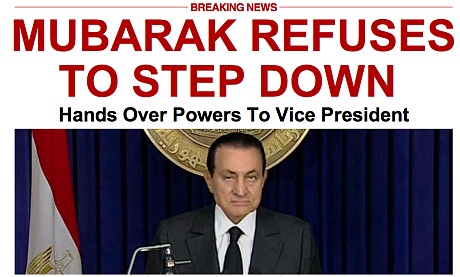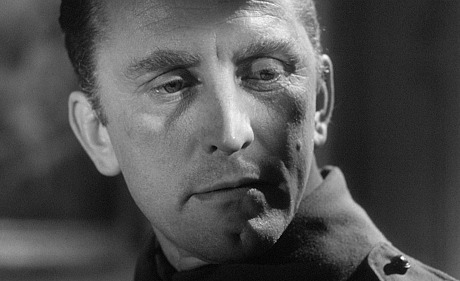There’s no mistaking where Michael Angarano‘s anti-hero in Max Winkler‘s Ceremony (on demand 3.4, theatrical 4.8) is coming from. Relentlessly if not obnoxiously in love with an older, engaged Uma Thurman, Angarano’s Sam Davis is clearly descended from Jason Schwartzman‘s Max Fischer in Rushmore. How can Winkler deny the inspiration?
Daily
Days Like These
In a 2.10 Marie Claire interview with The Fighter‘s Melissa Leo, Thelma Adams has gone right to the big topic at hand.

The Fighter costar Melissa Leo
Adams: “It seems that the big criticism has been that you’re the frontrunner behaving like the underdog.”
Leo: “Whatever my position might have been as we came in closer to the date with some wins in my pocket, I was not being told frontrunner. I could just feel in my heart this opportunity that has so vastly eluded me. I spent a month-and-a-half flying back and forth from the set of HBO’s Treme in New Orleans to L.A. to ‘pimp myself out’ like we all are doing this time of year.”
Adams: “So, what made you finally pull the trigger on this ad campaign?”
Leo: “I had deadlines to meet. In Sundance, we wondered: Should we put the ad in or not? Sure, it would just be fun, let’s jump and shout, because all I was going to say was ‘Consider.’ Here I am. Recognize me as this. It’s all okay.”
Adams: “Cue the firestorm.”
Leo: “The people I talk to know that I’m barely getting through each day. I don’t know if I would have thought of it alone, and nobody was saying to me that I was a frontrunner. There is something very disconnected about all of it because absolutely none of it is me. I’m known as an actor that people don’t recognize and as the characters that I play.”
Cannes Rundown, Digs
My personal preferences among Eric Lavallee‘s Cannes 2011 predictions include Dominik Moll‘s The Monk, Juan Antonio Bayona‘s The Impossible, Terence Davies‘ The Deep Blue Sea, the Dardennes brothers‘ The Kid With a Bike, Lars von Trier‘s Melancholia, Nuri Bilge Ceylan‘s Once Upon a Time in Anatolia, Pedro Almodovar‘s The Skin I Live In, Terrence Malick‘s The Tree of Life, Andrea Arnold‘s Wuthering Heights, Lynne Ramsay‘s We Need To Talk About Kevin, strong>Gus Van Sant’s Restless and Marina Zenovich‘s Roman Polanski: Odd Man Out.
I’m primarily pleased about HE’s new Cannes lodging. After learning yesterday that a Cannes apartment I’ve been sharing for the last two years is no longer available, I got lucky right away through a columnist friend and found a new place at almost the same rate and at a slightly better location (i.e., closer to the Palais).
Huge Embarassment
Could The Daily have blown it any worse? That alleged Nikki Finke photo that they posted this morning, taken by Hunter Walker, is reportedly a fake. Finke has told Gawker that it’s not her, and Anne Thompson and TheWrap‘s Sharon Waxman, who both know the Deadline founder, agree.

I suspected right away that the shadowed woman in the car wasn’t Finke. Her eyes are too vulnerable looking. That look she’s giving Walker seems to say, “Oh, no, wait…wait a minute…are you taking a picture of me?” She doesn’t look like a wolverine but some kind of blonde basset hound. She has the eyes of someone cautious, uncertain, a little scared of things. Like someone who works in a pet hospital or a beauty salon. Or who sits around the house and does nothing while her husband works.
In any event you’d think that Walker, apart from being wrong, could have taken a better shot than something this dark and hazy, though a Toyota windshield. Or that The Daily would have checked around before posting it, just to make sure.
Academy, Save Thyself
In the view of Daily Beast contributor Marlow Stern, AMPAS “should do the right thing and honor The Social Network over The King’s Speech with the Best Picture Oscar, lest they risk further alienating the younger generation of movie fans who have caught on to the Oscars’ blandness and predictability. This lack of imagination is one of the reasons why TV ratings for Hollywood’s biggest night have dropped precipitously from a high of 57.25 million viewers in 1998 — the year Titanic cleaned up at the awards — to just 41.3 million in 2010, despite nominating 10 films for the Best Picture Oscar instead of five.”
Has Joe Wright Sold Out?
In Joe Wright‘s upcoming Hanna (Focus Features, 4.8), Saoirse Ronan plays a teenaged girl raised by her ex-CIA dad (Eric Bana) to be a killing machine. That’s not wildly different from Chloe Moretz‘s “Hit Girl” backstory in Kickass, or Anne Parillaud‘s in La Femme Nikita. And we all know the territory, of course. Knifings, garrotings, lotsa bodies, speeding vehicles, rapid cutting, people going “aarrrgghh!”
So how did Wright, who began his British directing career as the new Anthony Minghella when he made Pride and Prejudice (’05) and Atonement (’07), manage to turn himself into an upscale hack in the Martin Campbell mold? He had the strong camera eye and the extended tracking shots and the mining of adult emotion, and now look at him. Look at the Hanna trailer, I mean. He’s shoveling popcorn.
Any way you slice it’s a weird transition. Did Wright find himself in a career funk after the failure of The Soloist and felt he had to somehow break himself out?
Is there an analogy between Wright doing a semi-predictable action-genre piece (how much do you wanna bet that Cate Blanchett turns out to be Ronan’s mom?) and Sam Mendes, another cultivated Brit director with mature emotional leanings, doing the next James Bond film? It’s the marketplace, of course. If you want to work you have to serve the tastes of the public, and the public, more and more or at least for the main part, often responds to formulaic crude-slick action fare. Not an American-type thing but something like Hanna, which is apparently of a lower order.
If nothing else, the presence of Eric Bana should give anyone pause. I’m sorry but life has taught me that if Bana has a role in a film, it’s most likely a problem of one kind of another. (The only variation in this rule has been his semi-comic role in Judd Apatow‘s Funny People.)
I'm Not Going!
4:07 pm: Tens of thousands in Cairo’s Tahrir Square are reportedly furious following Hosni Mubarak‘s refusal to step down in a speech he just gave a few minutes ago. While saying again that he wouldn’t run for president in September, Mubarak said he’ll transfer powers to Vice President Omar Suleiman, but will “continue the oath of his office” and will “continue to shoulder” his responsibilities and work for a peaceful transition of power.

Earlier: Apparently the Egyptian military has stepped in and told Hosni Mubarak, “Okay, enough is enough, pal…that’s it, you’re out.” Mubarak will give his farewell address on TV fairly soon (i.e., a couple of hours from now). What’s happened, apparently, is some kind of “soft coup.” What this means for the various aims of the Egyptian protestors and the eventual implementation of democratic reform is yet to be seen.
A N.Y. Times story is reporting that “the military’s chief of staff, Sami Anan, made an appearance in Tahrir Square, where he pledged to safeguard the people’s demands and their security. Thousands of protesters roared in approval.
“Gen. Hassan al-Roueini, military commander for the Cairo area, also appeared in Tahrir Square and told the demonstrators, ‘All your demands will be met today.’ Some in the crowd held up their hands in V-for-victory signs, shouting ‘the people want the end of the regime’ and ‘Allahu akbar’ or “God is great,” a victory cry used by secular and religious people alike.
“The moves marked a decisive turn in an uprising that has brought hundreds of thousands into the street in the most sweeping revolt in the country’s history. So far, the military has stayed largely on the sidelines, but Thursday’s statement suggested it worried that the country was sliding into chaos. The military called the communiqu√© ‘the first statement of the Supreme Council of the Armed Forces,’ strongly suggestive that it had arranged to take power in Egypt.
“Wael Ghonim, a Google executive and protest organizer whose anti-torture Facebook page helped spark the movement, wrote on his Twitter feed Thursday evening: ‘Mission accomplished. Thanks to all the brave young Egyptians.'”
Last 2010 Oscar Shot
Last night Deadline‘s Pete Hammond reported that he’s “picking up some interesting trends” in his chats with Academy pallies. “Not just the expected strong support for The King’s Speech (it’s real), but also a surprising amount of backing for The Fighter. It has been the most mentioned movie after The Social Network and could figure significantly by drawing mostly first- and second-place votes.”

“Because you don’t know the answer to that question, I pity you.”
He also noted that while “some” of his Academy pallies “have already cast their ballots, most have not.” So if there’s any point in making a last-minute plea to any fence-sitters out there, it needs to happen right now. So here’s my last attempt to influence the final vote, however slightly or marginally.
BEST PICTURE: I realize that The King’s Speech crowd is unreachable, intractable and adamantine. All they want to do is vote for the movie they like the best. That’s all they care about. It doesn’t bother them that they’re about to contribute to a Great Historical Embarassment along the lines of the Academy’s giving the Best Picture Oscar to Driving Miss Daisy, Chicago, The Greatest Show on Earth, Dances With Wolves and Around The World in Eighty Days. They’ve apparently got some kind of weird enzyme in their system that blocks any sense of shame or hesitancy about this.
Allow me to paraphrase words spoken to a military tribunal in Paths of Glory by Kirk Douglas‘s Colonel Dax: “There are times when I’m ashamed to be a member of the industry-supported, Oscar-following community, and this is one such occasion. Ladies and gentlemen of the Academy, proclaiming to the world that you sincerely believe that The King’s Speech is the Best Picture of 2010 reveals a mediocre sensibility. It will be seen in the eyes of history as a very pedestrian call, and will haunt each of you, due respect, to the day you die. I can’t believe that the wisest and noblest impulse among movie lovers, which is the ability to recognize the difference between a very good and highly likable film vs. one of exceptional craft and dimension and incandescence, can be completely dead here. Therefore, I humbly beg you to come to your senses, forget about what you ‘like’ and think of the contempt and derision that may be your legacy for decades and centuries to come.”
BEST DIRECTOR: You know it has to be The Social Network‘s David Fincher — you know it does. Forget the DGA call. This is your deal. Good effin’ God…please.
BEST ACTOR: Colin Firth, The King’s Speech — a fine performance, a well-liked fellow, a done deal.
BEST ACTRESS: If you’re really going to give the Best Picture Oscar to The King’s Speech, you just can’t go “full fart” by giving the Best Actress Oscar to Annette Bening, as good as she is in The Kids Are All Right. You’d be creating a rep for the Oscar telecast as the Baby Boomer Movie Awards, which will obviously hasten its irrelevance, and the Movie Godz would completely freak out. You have to stay with Black Swan ‘s Natalie Portman and show respect to the millions of women who’ve been flocking to this film and who will push the total gross to over $100 million.
BEST SUPPORTING ACTOR: You’ve got to stick with The Fighter‘s Christian Bale. Forget about any last-minute shift to The King’s Speech‘s Geoffrey Rush, as wonderful as his voice sounds when it’s been well-amplified with sub-woofer speakers.
BEST SUPPORTING ACTRESS: Whatever feels right. My favorite performance was given by Amy Adams in The Fighter because it was my favorite character, but the actress I most admire at this stage of the game and therefore must support is the great Melissa Leo. In the words of David Poland, “If you were going to vote for Melissa Leo and are considering not voting for her because of [her self-financed] ads, you are an ass.”
BEST ADAPTED SCREENPLAY: Aaron Sorkin, The Social Network.
BEST ORIGINAL SCREENPLAY: If you give the Oscar to The King’s Speech‘s David Seidler, then okay, whatever…it took him years to get there and he did a very good job. And he may have cinched it when he answered that question I asked him during the Santa Barbara Film Festival “It Stars With The Script” panel. But it ought to go, I feel, to Inception‘s Christopher Nolan for the extraordinary vision and originaltiy.
BEST ANIMATED FILM (FEATURE): Toy Story 3.
BEST DOCUMENTARY FILM (FEATURE): Inside Job.
BEST FOREIGN LANGUAGE FILM: Biutiful.
BEST ART DIRECTION: Inception.
BEST CINEMATOGRAPHY: Roger Deakins, True Grit.
BEST COSTUME DESIGN: Alice in Wonderland.
BEST FILM EDITING: The Social Network.
BEST MAKEUP: You can’t give it to The Wolfman…no! And you can’t give an Oscar to Barney’s Version for putting wigs on Paul Giamatti. Default winner: The Way Back.
BEST ORIGINAL SCORE: The Social Network.
BEST ORIGINAL SONG: “We Belong Together,” Toy Story 3.
BEST SOUND EDITING: Inception.
BEST SOUND MIXING: Inception.
BEST VISUAL EFFECTS: Inception.
Watch Your Ass
If this was a film and Lindsay Lohan was playing a character like herself, listening to the warnings of a judge in court, I’d be geninely impressed. Because she’s not “acting” here, and yet her dolled-up face is a portrait of torrential contradictions. She’s nodding and going “yes, Your Honor” but it’s obvious she’s not there. She’s quietly livid because she’s finally begun to understand that her life is really and truly fucked. Lohan is a very fine actress, but in high-end Hollywood circles she’s seen as beyond repair.
For A Moment…
I began reading Stu VanAirsdale‘s latest Oscar Index article in a state of profound excitation. An upset is coming? Really? Or may be coming at least? O joy! But my heart began to sink when I got to the third or fourth graph and I realized that VanAirsdale is just blowing confetti out of his ass and/or doing an air-guitar riff. Fake out! And back came the gloom.
Banking on Debt?
John Madden‘s The Debt, an espionage thriller, will be distributed for Miramax by Focus Features and Universal Pictures International. Focus will open it in the U.S. on Wednesday, 8.31, and UPI will release the film internationally.
I could run this announcement as a boilerplate thing or fill things in with my opinion of the film. I just flipped a coin and it came up heads so here’s my 9.15.10 Toronto Film Festival review of The Debt‘s first 40 minutes:
“By the time I left, John Madden’s The Debt had administered several self-inflicted wounds. Bruises, scratches, cuts, scrapes — they kept coming non-stop. The biggest wince was realizing early on that all the actors — principally Sam Worthington, Helen Mirren, Tom Wilkinson, Ciaran Hinds, Jessica Chastain, Martin Csokas — had been urged to ‘act.’ There wasn’t a moment in the portion that I watched in which they didn’t seem to be (a) speaking lines and (b) using every thespian trick in the book to let us know how their characters are feeling. There’s nothing that kills a movie faster than this.
“I especially hate it when actors exchange ominous ‘looks’ in a scene. Looks in which actor says to another, ‘Are you sensing the same vibe I’m sensing?’ Or ‘I’m getting concerned about how things are going — how about you?’ Scenes in which an actor conveys his/her feelings about another by looking at them longingly or angrily or coldly or playfully are, for me, mute nostril agony.
“And I think it should be carved in stone that you can never have an older actor or actress be portrayed in a younger incarnation by another younger actor/actress, or vice versa. It never works, and always kills the movie in question.
“In this film — a thriller about three young Israeli Mossad agents who captured an Adolph Eichmann-like Nazi war criminal in mid 60s East Berlin, and their older selves dealing with lingering consequences — we are asked to believe the following pairs: (a) Worthington aging into Hinds — ridiculous, absurd; (b) Chastain aging into Mirren — laughable, in a pig’s eye; and (c) the 44 year-old Csokas, speaking with his usual bizarre New Zealand-by-way-of-Hungary accent, aging 40 years hence into the 61 year-old Wilkinson, his speech patterns utterly devoid of the Csokas patois.
“I felt angry and insulted. My feelings wouldn’t have been any different if Madden had come up to where I was sitting during the showing and urinated on my leg. There’s no getting over this aspect. It alone kills The Debt, although there were may other assists in this regard. I could describe four or five others but I’d just be describing variations on the same sprawling green lawn composed of identical blades of shit grass.”
The Horror
For what it’s worth, I can faintly sympathize with Nikki Finke‘s reportedly extreme discomfort with having a present-day photo of her circulated by Rupert Murdoch‘s The Daily. Last week I sat down with Gold Derby‘s Tom O’Neil and Paul Sheehan for an Oscar race discussion. When I saw the first portion of the video yesterday I almost fell out of my chair.
All I can think when I watch it is how I really have to (a) start up with 24 Hour Fitness again when I get back to West Hollywood and (b) drive down to Mexico for some affordable plastic surgery to fix those godawful bags under my eyes and and for my appalling turkey neck. It just sends me into a tailspin of depression. That bloated fuck in the video is not the guy I see in the bathroom mirror. Why can’t I age like Cary Grant did? Why can’t I at least look more like Todd McCarthy? I’m starting to resemble Albert Finney, for God’s sake.
I shared my sense of horror with O’Neil, and he told me to knock it off and that I look fine and that I’m paranoid, and that he should have told me sit up straight because my slumping created the illusion of a turkey neck I really don’t have, etc. It was nice of him to try and cheer me up.
